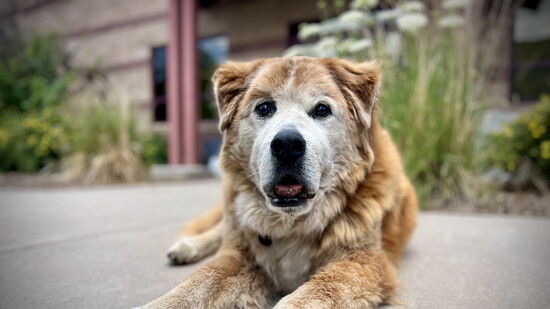Caring for an aging pet is one of the most beautiful—and sometimes bittersweet—experiences a person can have. It’s characterized by slower walks, longer cuddles, pill bottles on the counter, and the warm, trusting eyes of a beloved companion who has grown older by your side.
Senior pet care often involves adjusting to a new routine. It might mean installing a ramp by the bed, placing potty pads, trimming nails more (or less) often, or learning to cherish a toothless smile. A client once told me, “It’s more pills and vet bills now… but he’s our special little guy.” That’s the kind of love that defines this chapter—unconditional, patient, and deeply rooted in shared memories.
These golden years require a bit more attention and effort. Some pets are lumpy and bumpy, while others move slowly or sleep all day. Some struggle with vision or hearing loss or pace around the house at night, unsure of where they are. It can be challenging, yes—but also tender and meaningful. It’s a time when many pet parents say they’ve learned the most about love.
I once had a cat named Goldie who, after I left for college, adopted my mom as her new person. I’ll never forget the moment I came home and saw the way she looked at my mother—like she believed we’d both just grown old together. That moment reminded me that even as their bodies change, our pets stay loyal to the love we’ve shared.
In veterinary medicine, we typically refer to dogs as “seniors” around age eight and cats around ten, but this varies based on breed, size, and individual health. A small Chihuahua might be lively at 12, while a Great Dane can show signs of aging at five. We also consider hamsters elderly at 18 months, and tortoises don’t reach their senior years until well into their 60s.
Regardless of age, what matters most is quality of life. Many senior pets slow down, lose muscle tone, or struggle with arthritis. Some become anxious or disoriented. Others surprise us by staying active and engaged long after we thought they’d passed their prime. I’ve seen "young-at-heart" seniors who keep up with puppies at the dog park!
One of the best gifts we can give aging pets is creative support. If your dog doesn’t hear well anymore, no worries—thunder doesn’t scare them now. If your cat can’t leap onto the counter, she might enjoy a soft perch by the window with a bit of help from pet stairs. A hike might be too much, but a sniff around the trailhead still brings joy.
Enrichment is more important than ever. Puzzle toys, scent games, short “sniff-aris,” and slow-motion fetch keep minds sharp and joints healthy. And yes, despite the old saying, you can teach an old dog new tricks. Positive reinforcement training is beneficial at any age.
As a member of the International Association for Animal Hospice & Palliative Care, I’ve seen firsthand how caring support, open conversations, and veterinary tools can make the aging process easier. From laser therapy and supplements to in-home visits and gentle medications, we offer a range of options to enhance comfort and well-being.
And when the time comes to say goodbye, it’s different for every family. We offer a “Quality of Life Scale” at PonderosaPet.com to help guide pet parents through the process. These moments require grace—not judgment—and space to trust your instincts and the bond you’ve shared. Talk to your pet. Talk to your people. Talk to me.
A colleague once told me, “Leaving this world isn’t the opposite of living—it’s the opposite of arriving.” I carry that thought with me. Senior pet care isn’t just about managing decline—it’s about honoring a life well-lived and finding beauty in the present.
Ponderosa Pet Mobile Vet offers loving in-home care and support to comfort and honor your senior pet’s golden years. Reach out to us today!
Senior pet care isn’t just about managing decline—it’s about honoring a life well-lived and finding beauty in the present.
